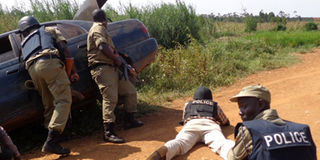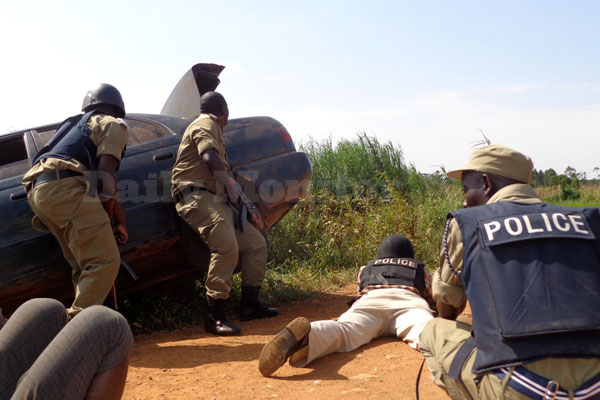Prime
Police report: Crime increases, detectives overwhelmed

Shoot-out. Police officers open fire at suspected robbers in Iganga District yesterday. PHOTO BY YAZID YOLISIGIRA
What you need to know:
•Crime in 2017 up by 3.3 percentage point from previous year
•Three of every 10 cases reported to police taken to court, half of which are pending trial. Convictions secured in about 30 per cent of prosecuted cases.
•Nine of 10 of all suspects male and more men are victims of crime in a country where women outnumber males.
•Lira, Ntungamo, Mbarara, Mpigi, Mbale and Gulu recorded highest crimes
•Sexual offences (defilement and rape) are down by 14 and 10.6 percentage points, respectively.
•Mob justice is up while burglary and domestic violence reduced
•More people marginally shot dead in 2016 than in 2017, with more cases reported in Moyo, Kakumiro, Mayuge, Mbarara, Katwe and Hoima
• Shs169b stolen in 2017 through cyber crime
Kampala. Crime in the country has increased by 3.3 percentage points within a year from 2016 with barely 4,666 of the required 14,000 detectives available to investigate cases, according to the police crime report released yesterday after four years.
With each investigator handling twice or more workload than the United Nations-recommended 12 case files per detective each year, seven of every 10 cases reported to police in 2017 for unexplained reasons never reached court.
And conviction rate for the 66,626 cases prosecuted was low, at 28 per cent. In fact, half of the cases are still pending in court.
Delays in conclusion of cases, where suspects are freed on bail, partly contributed to a jump in mob justice that claimed 603 lives.
Most of the mob incidents were registered in Mbarara, Luwero, Iganga, Masaka, Hoima, Oyam, Mukono, Kamuli and Lira districts.
The western districts of Mbarara and Ntungamo; Lira and Gulu in the north; Mpigi in central; and, Mbale in eastern Uganda overall recorded highest crime rates.
READ:
Police did not explain why. A trend analysis, based on 2016 and 2017 data, shows crime is committed in the country more in April, the month of Easter, and November toward Christmas.
Residents in Lango, Acholi, districts from Pallisa to Busia and Rwizi area in western Uganda comparatively reported more crimes while Busoga region registered the least number of cases.
The 2017 crime report released by the Inspector General of Police, Mr Martins Okoth-Ochola, did not attempt an explanation for the spikes in crime in those months.
“The task of fighting crime and keeping our roads safe is still a major challenge,” Mr Okoth Ochola, who replaced Gen Kale Kayihura in March this year, said.
“We are convinced that our community policing drive with popular participation and vigilance, combined with a motivated professional force, shall overcome acts of criminality,” he added.
Under Gen Kayihura, police abruptly stopped releasing the annual crime report in 2014.
The military last month took him and top officers who served under him into custody on offences whose particulars are yet to be publicly disclosed. Seven senior police officers considered Gen Kayihura confidants had been arrested last September and are prosecuted by the military on charges of, among others, kidnap and illegal repatriation of Rwandan refugees and illegal possession of government stores (weapons).
The IGP’s sacking came a year after President Museveni publicly berated him and the Force he superintended of being infiltrated by criminals, which he said had handicapped civilians from reporting crimes to police.
Between 2016 and early this year, there were increased reported cases of violent crimes, assassinations and up to 211 abductions/kidnaps in 2017 alone. Twenty-two of the victims are still missing to-date and three killed, the Criminal Investigations Directorate director Grace Akullo said while presenting the specifics of the report released yesterday.
Some 167 out of 4,433 people killed last year were gunshot victims. More people were killed in 2017 than in the previous year, although the numbers of those shot dead declined.
South Sudanese refugee-hosting Moyo, Kakumiro, Mayuge, Mbarara, Kampala metropolitan, Hoima and Bundibugyo districts, which registered highest such cases, are more likely the places where one can take bullets. More people were, however, killed in Kiryandongo, Mbarara, Luwero and Mbale than elsewhere in Uganda.
“Homicides, child-related crimes, thefts, corruption and narcotics registered an increase in cases reported to police,” the report reads in part.
Police said they recovered 634 kilogrammes of narcotics at Entebbe International Airport alone and arrested 50 suspects from 23 countries. Sixteen of them were convicted and the government cashed in Shs320m in fines.
Money stolen through cybercrime last year amounted to Shs169b, according to the report.
Rape cases decline
In 2017, sexual offences (defilement and rape) were down by 14 and 10.6 percentage points, respectively, compared to 2016 records.
Nine out of every 10 of suspects that police picked last year were men and the report showed significantly higher number of men were crime victims in a country where women outnumber men.
Top crimes committed in the country include common assaults, domestic violence, defilement threatening violence and obtaining (goods) by false presence.
There was also a dramatic jump, by 52 percentage points, in theft cases where the suspects grab any valuable from rail sleepers to necklaces/hand bags and high-end electronic gadgets.




